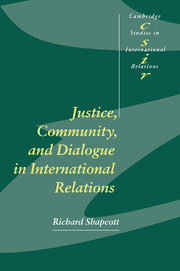Book contents
- Frontmatter
- Contents
- Acknowledgements
- Introduction
- 1 Beyond the cosmopolitan/communitarian divide
- 2 Community and communication in interpretive theories of international relations
- 3 Emancipation and legislation: the boundaries of conversation in poststructuralism and the critical theory of IR
- 4 Philosophical hermeneutics: understanding, practical reasoning and human solidarity
- 5 Philosophical hermeneutics and its critics
- 6 Towards a thin cosmopolitanism
- Conclusion
- Bibliography
- Index
- CAMBRIDGE STUDIES IN INTERNATIONAL RELATIONS
Introduction
Published online by Cambridge University Press: 22 September 2009
- Frontmatter
- Contents
- Acknowledgements
- Introduction
- 1 Beyond the cosmopolitan/communitarian divide
- 2 Community and communication in interpretive theories of international relations
- 3 Emancipation and legislation: the boundaries of conversation in poststructuralism and the critical theory of IR
- 4 Philosophical hermeneutics: understanding, practical reasoning and human solidarity
- 5 Philosophical hermeneutics and its critics
- 6 Towards a thin cosmopolitanism
- Conclusion
- Bibliography
- Index
- CAMBRIDGE STUDIES IN INTERNATIONAL RELATIONS
Summary
Insofar as hermeneutics is more than a theory of the human sciences, it also has the human situation in the world in its entirety in view. Thus it must be possible to include different cultures, religions, and so on, and their relations. What is at issue here is that when something other or different is understood, then we must also concede something, yield – in certain limits – to the truth of the other. That is the essence, the soul of my hermeneutics: to understand someone else is to see the justice, the truth, of their position. And this is what transforms us. And if we then have to become part of a new world civilisation, if this is our task then we shall need a philosophy which is similar to my hermeneutics: a philosophy which teaches us to see the justification for the other's point of view and which thus makes us doubt our own.
No one can say what will become of our civilization when it has really met different civilisations by means other than the shock of conquest and domination. But we have to admit that this encounter has not yet taken place at the level of an authentic dialogue. That is why we are in a kind of lull or interregnum in which we can no longer practice the dogmatism of a single truth and in which we are not yet capable of conquering the scepticism into which we have stepped.
- Type
- Chapter
- Information
- Publisher: Cambridge University PressPrint publication year: 2001

